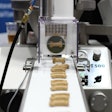
When will dogs and cats get the right to vote? At the rate the humanization of pets is going, it will be in the 2008 elections. Yes, I'm exaggerating to make a point: The status of dogs and cats has risen dramatically in the past few decades. One shining example is a captivating company called Three Dog Bakery®.
The company produces food and treats made from all-natural, 100% human-quality ingredients for dogs in AIB (American Institute of Baking) or USDA environments that are specifically formulated for companion animals (dogs or cats). Recently, Mr. Robert Islinger, Three Dog Bakery President and CEO, shared the Three Dog Bakery story with me. We started with their Mission Statement:
We are purveyors of high-quality, human-like products for companion animals. We execute our business with a passion for the animal, and respect for the relationship that exists between the pet and the human to benefit our stakeholders.
Outlook: Dazzling
Twenty-four months ago the company's ultrapremium brand was in less than 200 stores in the world. Today the brand is present in over 9,500 stores in the United States alone. What have they been doing right? For starters, they've done a brilliant job of making and marketing ultrapremium petfoods.
Just what are ultrapremium pet-foods? Ed Mareth of 3D Corporate Solutions shared his views at a recent Petfood Forum. Mareth believes that ultrapremium pet-foods are those made with 100% ultrapremium ingredients:
Ingredients produced with the intent of being consumed by humans.
Ingredients handled after leaving the human food chain that meet the same "safety and quality" standards found in human-edible ingredients.
Ingredients that can be traced through a chain of custody that validates handling procedures through the entire supply chain. Mareth noted that, "This is a tough one, because most ingredients go through 14 steps before they reach a finished petfood. That's a lot of HACCP plans."
The essence of TDB
Islinger believes the essence of the Three Dog Bakery process involves taking the "e" out of humane. When one treats another "humanely," there is a degree of condescension. However, when one treats another as a "human," there is a degree of parity. "At Three Dog Bakery," Islinger affirms that, "we understand the growing trend of companion animals becoming family." We are advocates of this movement to anthropomorphize the care of pets, we believe that ingredients declared as unfit for human consumption, were done so for good reason, and that people have the right to know that fact and choose alternatives. The Three Dog Bakery motto is "It's not Pet Food. It's Food for Pets."
TBD core values
Islinger asserts, "Our strategies and our associates demonstrate a genuine concern for companion animals. We manufacture and/or select our products with the needs and health of the animal as our first priority. To support this creed we passionately embrace the concept of "Food for Pets" vs. petfood. Ed Mareth cited several criteria for ultra premuim foods and treats, but Three Dog Bakery cites:
We strive to use all-natural ingredients;
We will use the "right" ingredient, cost is our last concern;
We pursue human-quality manufacturing conditions;
We view the AAFCO standards as minimum requirements and we endeavor to meet higher ones; and
We will follow AAFCO policies and other industry and government regulations. However, since we are unique in the industry, we will exercise our constitutional right to utilize "Freedom of Speech" in packaging, if it is truthful, not misleading and defendable.
Inspiration and Grace
Three Dog Bakery was founded by Dye, Beckloff, three dogs and a 59 cent biscuit cutter. It all started with a mission of mercy. The founders started cooking to save Gracie, a deaf albino Great Dane puppy who was diagnosed with an eating disorder and refused all commercial and veterinary foods. With the help of some local institutions, the two started researching, experimenting and cooking for Gracie. Gracie not only survived, but she thrived, and the founders opened the first "bakery for dogs" in Missouri. Additional bakeries were added to the chain and eventually the product was purchased by retailers on a wholesale basis. A book "Amazing Gracie" documents this story, and several cookbooks detail the products of the brand.
Vital signs
Three Dog Bakery is headquartered in Kansas City, Missouri, USA, Tel: +1.816.474.3647, E-mail: [email protected], Website: threedog.com. It is owned by a private equity group.
Facilities:
The company's headquarters, distribution center and its artisan baking facility are in Kansas City, Missouri, USA. The artisan baking facility manufactures the products that are elaborate or highly customized. It develops new products and produces the initial runs, and houses the quality control function.
People:
Three Dog Bakery employees 75 people, including Patrick Ramsey who was once best known to diners as the executive chef and managing owner of a restaurant in Charleston, South Carolina, USA, called Circa 1886. As the executive chef of TDB, Mr. Ramsey deals with a clientele with much more perceptive palettes than those he has served in the past.
Products:
The brand's assortment includes Baked Food for Dogs, Entrees for Dogs; a variety of holiday assortments, and treats for everyday use (Lick n Crunch, Woofers, Bark n Fetch Biscuits, Itty Bitty Bones, We Pity the Kitties Cat Treats, and dozens of others).
SKUs:
50 for the mass channels and over 150 in the TML Bakery retail operations.
Private label:
Less than 5% of the company sales are private label.
Geographic coverage:
There are 34 retail Three Dog Bakeries, set up through a trademarked licensing arrangement throughout the United States, Canada, Japan and Korea. Also, the brand can be found in over 9,500 stores in the US such as Kroger, Publix, Target, Wegmans, Wal-Mart, HEB, Food Emporium, Lowe's Foods and many others.
Distribution channels (% of sales):
Grocery 40%; Mass/Club/Drug 32%; and Specialty/Internet/Shopping Channels/Bakeries 28%.
Keys to growth:
Presenting a high-quality product, defined as all-natural, made from 100% human-quality ingredients, designed in an anthropomorphic manner, uniquely packaged and supported by the theater of retail bakeries that are identical to their human counterparts.
Subsidiaries:
Veterinary Mealsa food line made of all-natural, 100% human-quality ingredients. The Three Dog Bakery "food for pets" concept for pets with special needs.
Islinger insights
Here were some of my questions, along with Mr. Islinger's responses:
What are your most difficult challenges?
Breaking the paradigm that food for companion animals must be feed. The American consumer is changing the way they embrace their pets. While our pets are becoming members of family, the majority of regulators view their food as feed, petfood manufacturers stretch definitions with statements such as "real chicken", and some brands position their organic ingredients as being of the highest quality, even though they may have been condemned.
Where do you see your biggest opportunities?
Consumers' awareness of what is going into petfoods will improve over time, and given the choice, many pet parents will chose "food for pets" over petfood.
How do you go about making major capital investment decisions?
Our Board of Directors is quite diverse and experienced in evaluating both the strategic and ROCE metrics required to pioneer a new category of consumer goods.
How many new products do you tend to introduce per year?
In the mass, grocery and retail bakeries channels, some 10-20 skus per year.
Please describe your R&D program.
The company's standard product-development process focuses on formulation development, packaging and ingredients. Over the past several years, TDB has successfully developed innovative dog treats and dog food in an effort to meet retailer and consumer needs and to expand its product lines. In developing these new products, the company focuses on the reception such products will receive from pets and their owners as well as their overall profitability for TDB and the retailer.
The company develops ideas for new products from a number of sources, including its product development team (which consists of five focused team members); its sales force, which is constantly in touch with the other potential competitive products; its owned and licensed local retail bakery shops; and its customers.
Trend or fad?
Why should our industry embrace ultrapremium standards? Because, Mareth contends, there are monumental changes coming to the way the food chain is regulated. In particular, the animal food industry. Look at the scale of change in Europe. In addition, there are, for all practical purposes, no "quality standards" for today's ingredients in the US. Product definitions yes, quality standards no. He also predicts that it is only a matter of time before the world and the media take an interest in what is entering the grocery store, home and cupboard as a result of loose interpretation of product standards in the petfood industry.
Like it or not
Ultrapremium ingredients today are "human-quality." You may not like it, but the only way to guarantee safe, consistent and quality ingredients is to buy "human-quality" raw materials.
Mr. Mareth is probably correct. Many omens, signs, premonitions and forecasts point in that direction. Ultrapremium petfood may take a substantial slice of the pet food pie.
Who knows, it may become common for food companies to make meals intended for dogs and people. It's about time we get some of their food.


















